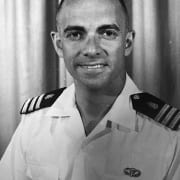A Silver Star and a Monument for “Super Doc”
By Harvey Weiner
How does one tell the incredible story of a Jewish-American Vietnam War hero so that it is believable?
Melvin “Mel” Lederman was born in Brooklyn, New York and lived in Brookline, Massachusetts at the time of his death in Vietnam.
He served in the U.S. Army from 1946 to 1948 in Alaska, where he contracted a virulent rash, leading to his being on partial disability. After his honorable discharge, he sought education under the G.I. Bill and earned a B.S. and a M.S. in Human Genetics from Michigan, an M.S. in physics from Yale, and an M.D. from Harvard Medical School. After a series of residencies and fellowships, including a chief residency in a VA hospital, he became Chief of Thoracic Surgery at Massachusetts General Hospital. In 1968, he was offered a surgery partnership in California. He seemed to be every Jewish mother’s dream!
Alas – not every Jewish mother’s dream! He was unmarried. He was a skydiver and a hunter. And, he turned down that job offer in California to join the Navy at age 40 and to volunteer to go to Vietnam.
In one of the letters he wrote from Vietnam, Lederman said, “Someone has to do the job of taking care of the kids, and it is obvious that I am it, so by conscience, I have been doing the best I know.”
Although he already satisfied his military obligation and was too old to be drafted, he joined the hospital ship USS Repose as a Lieutenant Commander. Before deployment he earned his jump winds at Fort Bragg.
While treating the wounded on the ship, Lederman realized the men were returning too late for any effective medical treatment to make a difference. He instead decided the best course of action was to treat the wounded on the battlefield. He started flying with the medivac helicopters and flew more than two dozen missions.
On at least one mission, he fought the enemy with his M-16. He was wounded on several occasions and received four Purple Hearts.
On one mission, he saved a wounded pilot’s life, but did not receive the Air Medal because he was not on flight status. I, along with many others in the Army, did not receive the Combat Infantry Badge because we were not assigned to an infantry position. However, there is now a Combat Action Badge for soldiers who engage in combat, but are not members of an infantry unit. Lederman was attached to HMM-364, known as the Purple Foxes, and he got nickname “Super Doc,” which he affixed to the naval identification tab on his flight jacket. He also went out on missions with the Navy Seals, but these unauthorized missions do not appear on his military record.
On November 29, 1969, shortly before his scheduled return to the U.S., Lederman was killed in action when his helicopter was shot down on a mission. It took 47 years for the Navy to award him a fourth Purple Heart, which they did in 2016. He was the only U.S. Navy doctor and the only Harvard Medical School graduate killed in Vietnam.
Two weeks before his death, Lederman was on a medivac mission in the Qui San mountain range northeast of Danang. A Cobra helicopter had been shot down and, under hostile fire, Lederman’s helicopter landed in an attempt to save the two pilots, who were believed to still be alive. Lederman and two others left their helicopter to search for the Cobra pilots, but found only their dead bodies. He helped bring them back to the helicopter, but then went back alone to the Cobra to retrieve their personal gear. The Cobra disintegrated moments after he left it. Upon his return to base, Lederman immediately counseled and treated one of the two other soldiers on that mission, who was suffering from post-traumatic stress disorder.
For that mission, Lederman and the two others were recommended for the Silver Star by the elite Squadron Awards Board. It appears this recommendation never reached the appropriate personnel at the Department of the Navy. As it has done in the past, will the JWV be of help?
Opposite the Massachusetts General Hospital is the Esplanade on the Charles River where the Boston Pops gives its annual Independence Day concert. The playing field there is named Lederman Park, where a monument in his memory is planned. However, more than $400,000 must be raised to fund the monument.
You can read more about Lederman and the memorial project at www.ledermanmemorial.org.
Volume 74. Number 3. 2020




